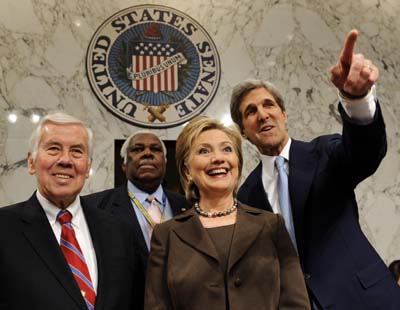
ROBERT BURNS and ANNE FLAHERTY
WASHINGTON
Secretary of State-designate Hillary Rodham Clinton called Tuesday for a “smart power” strategy in the Middle East that goes beyond the Israeli-Palestinian conflict to address other pressing issues like Iran’s nuclear program.
While offering no specific new peace proposal, Clinton spoke confidently of President-elect Barack Obama’s intentions to renew American leadership in the world and to strengthen U.S. diplomacy.
“As intractable as the Middle East’s problems may seem and many presidents, including my husband, have spent years trying to help work out a resolution, we cannot give up on peace,” she told her confirmation hearing before the Senate Foreign Relations Committee. She said that she and Obama are “deeply sympathetic to Israel’s desire to defend itself” but also worried about the humanitarian situation.
Clinton fielded an array of non-contentious, often friendly, questions from Democrats as well as Republicans, signaling the likelihood that she will be confirmed swiftly.
The panel’s ranking Republican, Sen. Richard Lugar, praised Clinton, calling her “the epitome of a big leaguer” whose presence could open new opportunities for American diplomacy.
But Lugar also raised questions about the issue of former President Bill Clinton’s fundraising work and its relation to her wife’s new post. Lugar said that the only way for Clinton to avoid a potential conflict of interest due to her husband’s charity is to forswear any new foreign contributions. The Indiana senator said the situation poses a “unique complication” that requires “great care and transparency.”
Clinton spoke in a clear, unhurried voice and looked at ease as she read a long introductory statement. She sat alone at a small, black-draped desk, with daughter Chelsea and a retinue of advisers behind her. Her husband was not present. Obama spokesman Tommy Vietor said the former president was watching the hearing elsewhere with his wife’s mother.
“President Clinton wanted to make sure the attention was focused on Sen. Clinton,” Vietor said.
The Senate hearing room was packed with ambassadors, current and former diplomats, supporters and aides sitting cheek by jowl. Dozens of photographers ringed Clinton as she spoke.
The Senate also was holding confirmation hearings for four other Obama choices for Cabinet and top White House positions. Appearing were Peter Orszag, to head the Office of Management and Budget, and Robert Nabors II, for deputy director of OMB; New York housing official Shaun Donovan, to be secretary of housing and urban development; Steven Chu, to head the Energy Department; and Arne Duncan, as education secretary.
Chu promised that if confirmed as energy secretary he will aggressively pursue policies aimed at addressing climate change and achieving greater energy independence by developing clean energy sources.
At the outset of Clinton’s hearing, Sen. John Kerry, D-Mass., the new chairman of the Foreign Relations Committee, pressed her on whether Obama sees a nuclear-armed Iran as unacceptable at any cost, or merely undesirable.
Clinton responded: “The president-elect has said repeatedly it is unacceptable. It is going to be United States policy to pursue diplomacy – with all of its (tools) – to do everything we can to prevent Iran from becoming a nuclear weapon state. As I also said, no option is off the table.”
She said the new administration would pursue a broader approach to the problem of Islamic extremism in Afghanistan and Pakistan.
On Iraq, Clinton said ending the war is a priority. The first step will be moving troops out of cities by June, in line with an agreement already established between the Bush administration and the Iraqi government. The agreement calls for all U.S. troops to be gone by the end of 2011. Obama has said he believes the withdrawal can be accomplished more quickly.
“It is being done within the context of the status of forces agreement, which (has) now clearly set forth the path that both the Iraqi government and the United States government intend to follow,” Clinton said. “There is some differences in timing but the important aspect of the so-called SOFA is that the United States government and President Obama will be withdrawing troops and the Iraqi government not only accepts that but wishes to facilitate that.”
Clinton also promised to push for stronger U.S. alliances around the globe.
“America cannot solve the most pressing problems on our own,” Clinton said, “and the world cannot solve them without America.”
She assured the committee that if confirmed, the State Department “will be firing on all cylinders” – applying pressure when needed and looking for opportunities to advancing U.S. interests.









